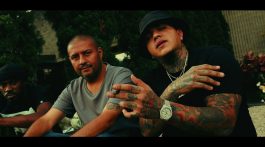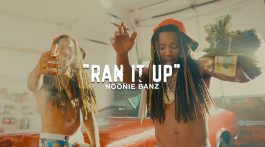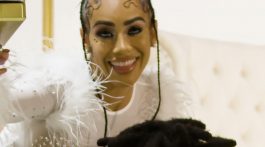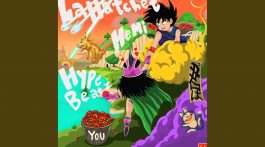24: How did you get your start in
the industry?
I started out as a DJ in the late 80’s, formed my own crew
originally called Idlerz but now known as Changez. I was one of only a few DJ’s
playing rap and Hip-hop records in Jamaica back then. My love for music led me
to Miami Dade Community College in 1989 to take sound engineering and Midi
classes.
After graduating I went back to Jamaica in 1992 with a wealth of
knowledge and hunger to work in a recording studio. I started Jamaica’s first
Hip hop Label called Grid Lock Records which released Stroke by Jamaican rapper
D.O.O.M. While doing allot of freelance engineering I met Jeremy Harding, who
was recording an old elementary school friend of mine Sean Paul. We would of
course dream of making it big someday, but his success did not happen just yet.
My frustration with the music business in Jamaica forced me to
move back to Miami in 1989, where I linked back up with Nick “Fury” and soon
joined Liquid S.H.I.E.L.D. Then by 1996 Sean Paul signed with Atlantic Records.
Talk about dreams coming true, I joined his team as Production Manager/Sound
Engineer. And I haven’t looked back yet
24: What kind of training do you
have?
I graduated from Miami Dade Community College with a degree in
Sound Engineering. To keep up to date with technology and recording methods and
processes, I attend all the conferences and conventions like AES (Audio
Engineering Society) and NAMM show (National Association Of Music Merchants),
as well as research, research, and research on the Internet. I am always on the
forums.
24: What is the pay like for your
job? How do you set your prices?
As Sean Paul’s Production Manager/Engineer I used to be paid
around $500 to $800 per show or about $1,500 per week for tours. As a freelance
studio engineer I charge $30.00 an hour,. Mixing ranges from $500 to $2,500 per
song, this price all depends on how much work is put into the mix and weather I
mix on Pro Tools HD or LE. Mastering costs $50 per song. I do give specials if
I do the whole album at once
Setting Prices is the hardest. I try to have a balance, between
charging enough to be properly compensated for the quality work, and not
charging too much to scare away clients. My method is simple, if you are paying
for a $500 mix then you get a really nice mix done in Pro Tools LE, but it wont
sound as amazing as the $ 2,500 mix done in Pro Tools HD. Essentially you get
what you pay for.
24: How do you find work?
It can be difficult finding work because the music business is
based off of relationships. I learned really early in my career that whom you
know outweighs what you know. But you will have a slight advantage if you are
confident and proactive.
Actually my first job as a studio engineer was by word of mouth,
heard about a job opening I called the studio, met with the Studio Manager and
was hired on the spot. Being hired, as Sean Paul’s Production Manager/Engineer
was a result of being around from the beginning, when he was an unknown artist.
Later on I remember hearing that Shaggy needed an engineer once and I just
called his studio and introduced myself over the phone. They were a little
hesitant but when they realized I used working with Sean it was a done deal.
24: Who were some of the
artists/musicians, etc. that inspired you to get into the music industry?
Inspiration for me came early as a DJ in Jamaica playing Run DMC,
and LL Cool J, Erik B and Rakim, but my favorite at the time was Public Enemy.
The Mixture of heavy hitting sampled drum loops with sampled phrases had me
hooked. Then I learned how it was done while I was in college, which is
where I got the name “Midilord”. During my college years I got inspiration from
RZA and Wu-Tang Clan. The funny thing is my very first gig as a live sound
engineer outside of a college event was a Wu-Tang Clan concert in Miami.
24: What kinds of equipment have
you used in the past and what do you use now?
I learned sampling on a Roland S330 and sequencing using Master
Tracks software on a apple Mac classic computer in the Midi Lab at Miami Dade
College Kendall Campus. My first purchase was a Boss DR 550 drum machine. From
there I have owned the Akai MPC 60, 60II, 3000, 2000, and 2000xl.
Today I have a MPC 4000 and a MPC 2500 Limited Edition, Digi 003R
running Pro tools 8. I have a very small setup at, which is strictly for my
production or people I like working with like Ghostwridah, Nasha Storm, and
Camille Kaye just to name a few. I am actually in the process of turning my
room into a mastering suite. For my clients projects, I prefer to rent a
studio.
I am proficient with Large format consoles like SSL, Euphonix and
Digidesign’s Pro Tools controllers like the Icon and the D-command. As for live
I preferd to use the Yamaha PM5D, or Digidesign Venue when I use to tour allot
24: What separates a good sound
engineer from a bad one? What are some bad habits some sound engineers have
that bands should watch out for?
First of all you have really understand the craft to even be an
engineer, Your not an engineer because you bought Pro Tools, and watched a few
youtube videos. A Sound Engineer is someone who understands the science of
acoustics and knows how to use the right tools to properly capture and
manipulate the captured audio. Now if you fit into this category what makes you
a good sound engineer is a good listener. Not just to what your recording or
mixing but listen carefully to what the client wants, and be quick but thorough
at what you do.
Bad habits of sound engineers, there are too many to list. One
that comes to mind is a lazy engineer. Watch out for the words “fix it in the
mix”, that either means I don’t know how to fix the problem or I am too lazy to
do it right. Rule of thumb in recording “garbage in, garbage out. I also hate
to see a engineer that uses plug in presets all the time. Now there are some
decent presets but most of them are useless. Reason being for instance is that
every single guitar ever made sounds different, so how is it possible to use a
preset compressor setting.
Can I say one more thing; the term “mastering” is too loosely used
by allot of so called engineers. The process is allot more than just inserting
a fancy mastering plugin on the master fader. But this discussion is for
another article.
24: What can artists do to make
life easier for their record to engineer?
Be prepared, try and have a concept of what you want your song to
sound like. You my not like what the Engineer has in mind for your song. Also
please “KNOW YOUR INSTRUMENT” sorry did I say that out loud.
24: What are you working on now?
Funny you should ask that. I have worn so many hats in this
business. For the past 16 years I have been a Recording/Mixing Engineer,
Producer, Studio Manager, Studio Designer/builder, Production Manager, Live
Monitor Engineer, Live Front of House Engineer and a long standing member of
Liquid S.H.I.E.L.D. until recently when I decided to try on a new hat, Artist
Manager. I discovered a beautiful young singer/songwriter/dancer named Camille
Kaye. She is going to be a problem in the near future, take my word for it.
24: What’s your best advice for
someone interested in becoming a sound engineer?
Why would anybody want to be an engineer? It’s the most
unappreciated job in the industry. The pay is only good if you work with a
signed artist and its hell on your family life, if you even want to have a
family life. But if you’re like me that love it anyway, make sure you study the
craft. Whether it be in a learning institution or interning with a studio. And
don’t let anybody tell you “you can’t be a sound engineer these days” I was
told that so many times when I started 16 years ago.
24: Why do you want to make a
career in this field?
It’s my passion for music and everything to do with the creative
and technical process. I feel great doing what I love to do, rather than doing
something just for the paycheck.
24: What would you say has been
your biggest achievement in the game so far?
That would have to be touring with Sean Paul as his Production
Manager/Engineer. For 6 years I handled all aspects of his live performance. I
made arrangements for the sound, lights, staging, dressing rooms, etc. Whether
it be a concert, club or TV performance I was there. And being his engineer I
would either mix Front Of House, or Monitors for his concerts as well as mix
the audio for his TV performances. I was even given the opportunity to do the
5.1 mix on his Duttyology DVD.
24: What are your hobbies outside
of music?
Here is a weird one for you, I love motorsports. I have done some
armature rally cross in Jamaica many years ago and I occasionally do autocross
events here in South Florida. I even won fastest driver in Florida at a Mazda
Rev It Up event about 7 years ago.
24: You’ve been doing a lot of
work with Ghostwridah as of late. How did that relationship come about?
We met about 6 years ago when he was just starting a buzz for
himself. Nick “Fury” Lewis was working on his mixtapes. He needed bangers and I
made some hot bangers but those songs were never released. But his sound is
different now, allot better in my opinion (not that he wasn’t good before).
24: What is it like working with
him in the studio?
He was always very focused, ready to record all the time. He is a
perfectionist, which can be hard to work with sometimes, he will always feels
like it could be better. But at the same time he is open to criticism and
suggestions. We work great together. He writes some amazing songs and I like
that he trusts my ears.
24: Who are some artists that you
would like to work with in the future?
That’s a long list but off the top of my head, I hope to work with
Drake he is multitalented and I don’t think he has peaked yet. I am a huge fan
of Missy Elliot I would definitely love to work with her. And the great
songstress Jill Scott, she is my favorite singer/songwriter.
24: How can fans or other artists
get in contact with you?
I can be reached at (786)
361-midi or send me an email to midilord@gmail.com. You all can follow me on
twitter at www.twitter.com/midilord and listen to some of my
production at www.myspace.com/damidilord I will try to update it
more often. Check me out on facebook by going to www.facebook.com/people/Midi-Lord/100001104960236
24: Any last words?
Yeah,
just want to thank you Breeze and 24hourhiphop.com for this interview. I feel really
honored to know there are people that want to know more about me and what I do
I also want to thank my family and friends for all the support, my success is
your success. Big shout out to Nick “Fury” Lewis (my honorary brother) and the
Liquid S.H.I.E.L.D. family. Keep up the good work Ghostwridah, I’m proud of
you. Big up mi bredrin Sean Paul and his manager Jeremy Harding (my other
honorary brother and fellow gear nut). Nuff love going out to Nasha Storm,
you’re the truth. And a big thanks to Coach of UNI Music Inc.
Finally for my
shameless plug, go checkout my artist Camille Kaye at www.myspace.com/camillemuzik, You all can see videos of
her at http://www.youtube.com/user/egrin15 and follow here here www.twitter.com/camillemusic










No Comment